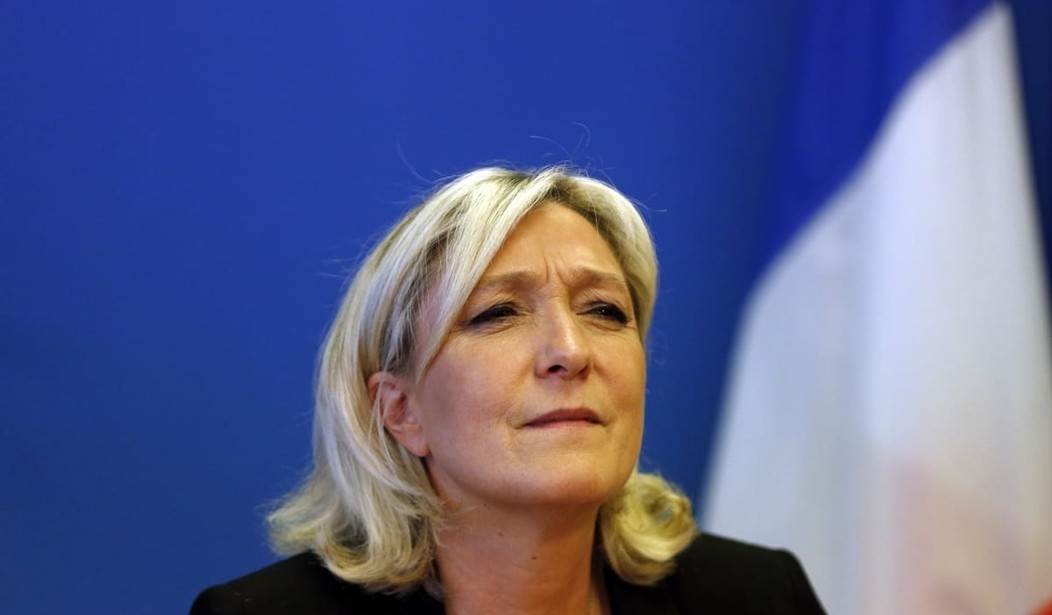France is turning Navy blue, Marine Le Pen’s color (“Marine” means “Navy” in French, among other things). In less than two years, her party the National Front (FN) has grown from 4.7 million votes (at the European Parliament elections in May 2014) to 5.1 million (at the “départementales,” or counties’ elections, in March 2015) to 6 million (at the regional elections first ballot on December 6).
These three successive elections were similar in many respects. They were based on proportional representation rather than the “first past the post” system which, in a modified form, is used for the French National Assembly elections. They were also marred, all three of them, by a 50% level of abstention. In other terms, the National Front was tested thrice under analogous conditions, and emerged at the end of the process as a winner — even if only a relative one.
On December 6, the National Front garnered 27.8% of the vote nationwide. This put it ahead of former president Nicolas Sarkozy’s conservative party, Les Républicains (LR), which got 27.3%, and of the current president François Hollande’s Socialist Party (PS), which lagged at 23.3%.
However, one must take into account broader coalitions as well. While the Left as a whole (the socialists supplemented by the French Green Party and the neocommunist Left Front) received 36.15%, and the Right as a whole (LR supplemented by Debout La France, a small party) 32.50%, the National Front has no allies. Moreover, National Front sympathizers are as a rule more motivated than classic Left and Right voters, and more likely to have voted on the first ballot. This means that if first ballot absentee voters vote on the second ballot scheduled for December 13, they will be more likely to support the socialists or the conservatives than the National Front.
“Republican pacts” (LR/PS temporary alliances) may prove crucial on the second ballot. In arithmetic terms, such alliances are stronger than FN almost everywhere. However, Sarkozy said he would not endorse them because he thinks they will benefit PS more than LR, and give some substance to Le Pen’s claim that PS and LR are but two faces of a single “anti-national” party, interchangeable with each other. But some alliances are eventually passed at the regional level nevertheless. What remains unclear is whether both parties’ voters will actually show some discipline. Many LR sympathizers may prefer FN over the Left, and many Left sympathizers may prefer abstention over support for the classic Right.
All in all, what has prompted the FN’s spectacular rise over the past two years? Two factors are to be considered. First is the jihadist attacks against France, which involved French and Belgian Muslims of North African descent.
The FN’s success last March at the counties’ elections came in the wake of the January massacres against Charlie Hebdo and HyperCasher, a kosher supermarket. Its success last Sunday came in the wake of the November 13 killing spree in Central Paris. Many voters apparently concluded that National Front, a party that constantly warned against the difficulties linked to immigration and the growth of radical Islam in Europe, was more serious and reliable than mainstream parties which tended to ignore such issues.
Second, Marine Le Pen has decidedly reshaped the National Front into a respectable, democratic-minded party. She has repudiated her father Jean-Marie Le Pen’s anti-Semitic and racist bad jokes, and made sure to reject party activists with a neo-Fascist background (including her father when he challenged her views).
In fact, the politics she now advocates look much closer to General Charles de Gaulle’s democratic nationalism than to far- Right nationalism. The speech she delivered last Sunday after the vote was quite remarkable in that respect: she said that the National Front stood for “Liberté, Egalité, Fraternité” (“Freedom, Equality, Brotherhood,“ the French Republic’s motto) as well as Laïcité” (the separation of Church and State). She said that it was embracing every French citizen who subscribed to such principles, whatever his or her ethnic or religious background.
No less remarkable was the National Front’s stand at the European Parliament in Brussels regarding Israel. Whereas the entire Parliament, including the European conservatives, supported a European Union initiative to tag Israeli goods produced beyond the 1949-1967 “green line,” and thus to condone at least a partial boycott of Israeli goods and companies, the French National Front rejected it along with its European allies: Geert Wilders’ Freedom Party in the Netherlands, Lega Nord in Italy, and others.
Here again, many voters who previously could not even think of supporting Jean-Marie Le Pen’s party are now prepared to do so.
Even those French voters who think that are still many good reasons to be wary of the National Front agree that neither LR nor PS is nearly as dynamic or consistent. For instance, it is an open secret that FN is now in league with Putin’s Russia, and actually got loans from a Russian bank. And Sarkozy is now praising Russia too, as Hollande is talking of a strategic alliance with Russia against ISIS.
Marine Le Pen is here to stay, whether one likes it or not.









Join the conversation as a VIP Member